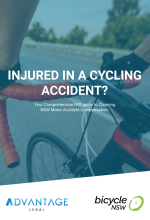
Cycling is a way of life for many, but when a cyclist is involved in a motor vehicle accident, the psychological impact can be just as significant as physical injuries. PTSD, anxiety, fatigue, and difficulty concentrating are common and debilitating effects that can last well beyond the resolution of any physical injuries.
Under the Motor Accident Injuries Act 2017 (NSW), cyclists who suffer psychological injuries in an accident may be entitled to treatment, care, income support, and potentially lump sum compensation. In this edition of Advantage Legal’s ‘Compensation Insider’ series, we explore what PTSD looks like for cyclists, how claims are assessed, and potential compensation entitlements under NSW law.

WHAT PSYCHOLOGICAL INJURIES CAN CYCLISTS SUFFER AFTER A MOTOR VEHICLE ACCIDENT?
Psychological injuries are often overlooked but can have a lasting impact. Cyclists commonly suffer from:
- Post-Traumatic Stress Disorder (PTSD)
- Adjustment Disorders
- Anxiety and Panic Disorders
- Depression
- Loss of concentration and memory issues
- Fatigue and persistent exhaustion
- Sleep disturbances
- Avoidance behaviours, including fear of cycling again
These conditions can affect everyday life, relationships, work capacity, and the ability to return to cycling.
UNDERSTANDING PTSD IN CYCLISTS AFTER A CRASH
PTSD can develop in cyclists following a traumatic crash. Symptoms may include:
- Flashbacks or intrusive thoughts
- Avoidance of cycling or traffic environments
- Hypervigilance and heightened anxiety
- Persistent fatigue and loss of concentration
- Withdrawal from social or physical activities
- Damaged relationships with friends, family or work colleagues
- Lack of personal care or interest in taking care of yourself
- Difficulty sleeping and completing daily tasks
- Noticeable behavioural changes
Without treatment, PTSD and related symptoms can become long-term conditions.
CAN CYCLISTS CLAIM COMPENSATION FOR PTSD IN NSW?
Yes. Cyclists diagnosed with PTSD or psychological injuries from a motor accident may be eligible for compensation under the NSW CTP scheme. Your entitlements depend on your injury classification as either threshold or non-threshold.
HOW ARE PSYCHOLOGICAL INJURIES ASSESSED UNDER NSW CTP LAW?
Threshold Psychological Injuries
- Includes minor or short-term conditions, like adjustment disorder or acute stress disorder.
- Entitles cyclists to weekly income support, medical treatment, and home care for up to 12 months after the accident.
Non-Threshold Psychological Injuries
- Covers serious psychiatric conditions like PTSD or major depressive disorder.
- Entitles cyclists to ongoing weekly income support, medical treatment, and care beyond 12 months. The exact duration depends on the severity of injury and whether there is a reasonable and necessary need for ongoing treatment and care.
- If the cyclist was not at fault, they may also be entitled to claim a lump sum for economic loss and pain and suffering.
Correct classification is crucial. Non-threshold injuries open the door to more extensive benefits and lump sum damages.
HOW DO YOU PROVE PTSD AFTER A CYCLING ACCIDENT?
Strong evidence is vital to secure the correct injury classification:
- Consistent GP and treatment records. Do not suffer in silence. Seek help!
- Diagnosis by a qualified psychologist or psychiatrist
- Statements from family or friends noting changes in behaviour following the motor accident.
- Proof of the impact on work, concentration, fatigue levels, and lifestyle.
- Reports from your treating GP, psychologist or psychiatrist.
- Independent Medical Examinations (IME) – Be sure to obtain legal advice before attending an IME for an insurer.
EXAMPLE: A CYCLIST’S PTSD JOURNEY AFTER A CAR COLLISION
An cyclist was hit by a car while riding. Although his physical injuries largely resolved, he experienced ongoing fatigue, loss of concentration, and severe anxiety when near traffic. He had a severe relationship breakdown with his spouse, ceased taking care of his personal grooming and relied on family members to cook and clean for him. He eventually sought medical help and was diagnosed with PTSD by both his GP and treating psychologist. By this time, his injury was quite chronic requiring both counselling and medication.
The cyclist was initially assessed as sustaining a ‘threshold injury’ due to insufficient information being provided to the insurer about the extent of his psychological condition and diagnosis. Advantage Legal secured a report from his treating psychologist and also from an independent IME. Both diagnosed the cyclist with PTSD as a result of the accident, meaning his injuries were assessed as ‘non-threshold’. The additional information was provided to the insurer for reconsideration as part of an internal review and was accepted. The cyclist was subsequently entitled to treatment and income support beyond 12 months and, because the driver was at fault, a lump sum compensation for economic loss and pain and suffering due to the severity of the PTSD and the impact it was having on his life.
WHAT SHOULD CYCLISTS DO IF THEY EXPERIENCE PTSD AFTER A MOTOR ACCIDENT CRASH?
- Seek Medical Help Immediately – Early diagnosis helps minimise the impact of psychological injuries and also protect your rights.
- Lodge a CTP Claim – Include psychological injuries at the time of lodgement if you are already suffering from symptoms. If your symptoms develop after claim lodgement, inform the insurer as soon as possible so they are on notice and can approve treatment.
- Keep Notes – Document any changes in behaviour or attitude. Examples include fatigue, loss of concentration, relationship breakdown, loss of motivation to look after yourself, changes in eating habits, sleep issues, and emotional responses.
- Get Legal Advice Early – With Advantage Legal, this means assistance with rehabilitation and treatment, proper classification of injuries and maximising your compensation entitlement.
HOW CAN ADVANTAGE LEGAL HELP?
Advantage Legal ensures your psychological injury is properly treated, assessed and compensated. We:
- Review your personal circumstances and ensure you are receiving appropriate treatment.
- Ensure early treatment approvals
- Secure treating medical evidence
- Obtain expert psychiatric assessments and reports
- Push for correct injury classification and challenge insurer rejections
- Claim your entitlement to lump sum damages (if applicable) and secure you the maximum compensation possible.
Our rehabilitation-focused approach means we assist you with your recovery while fighting for your rights.
YOU’RE NOT ALONE
If you’re a cyclist struggling with psychiatric injury such as PTSD or depression after a motor accident, you have rights. NSW law provides a pathway to treatment, home care, weekly wages, and compensation. Contact Advantage Legal today for a free consultation.
Advantage Legal’s Principal Solicitors are Accredited Specialists in NSW personal injury law and are the Exclusive Compensation Legal Partner of Bicycle NSW. We offer no-win, no-fee billing and guide you through every step of the compensation claim process including working with treatment and rehabilitation providers to fully understand how your injuries are impacting you. We also pay your upfront claim investigation fees such as specialist medical reports to ensure there is no financial burden on you throughout the progression of your claim, and only seek reimbursement at the successful conclusion of your claim.
NEED ASSISTANCE?

Our team of experts are ready to assist you with your NSW compensation claim.
We offer no-win, no-fee billing and guide you through every step of the compensation claim process including working with treatment and rehabilitation providers to fully understand how your injuries are impacting you. We also pay your upfront claim investigation fees such as specialist medical reports to ensure there is no financial burden on you throughout the progression of your claim, and only seek reimbursement at the successful conclusion of your claim.
This article is for educational purposes only and should not be relied upon as legal or financial advice. Readers should be aware that compensation law and policy documentation changes regularly and may impact the accuracy of the information contained within this article, which is current as at 1 April 2025. Any person relying on the information contained within this article does so at their own risk.